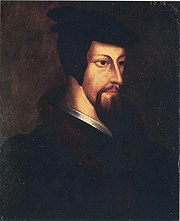Portal:Reformed Christianity/Selected article/3
John Calvin (July 10, 1509 – May 27, 1564) was a French Protestant theologian during the Protestant Reformation and was a central developer of the system of Christian theology called Calvinism or Reformed theology. In Geneva, his ministry both attracted other Protestant refugees and over time made that city a major force in the spread of Reformed theology. He is renowned for his teachings and writings, in particular for his Institutes of the Christian Religion.
Calvin's father was an attorney and in 1523 sent his fourteen-year-old son to the University of Paris to study humanities and law. His Protestant friends included Nicholas Cop, Rector at the University of Paris. In 1533 Cop gave an address "replete with Protestant ideas," and "Calvin was probably involved as the writer of that address." Calvin later settled for a time in Basel, where in 1536 he published the first edition of his Institutes. John Calvin died in Geneva on May 27, 1564. He was buried in the Cimetière des Rois under a tombstone marked simply with the initials "J.C.", partially honoring his request that he be buried in an unknown place, without witnesses or ceremony.

